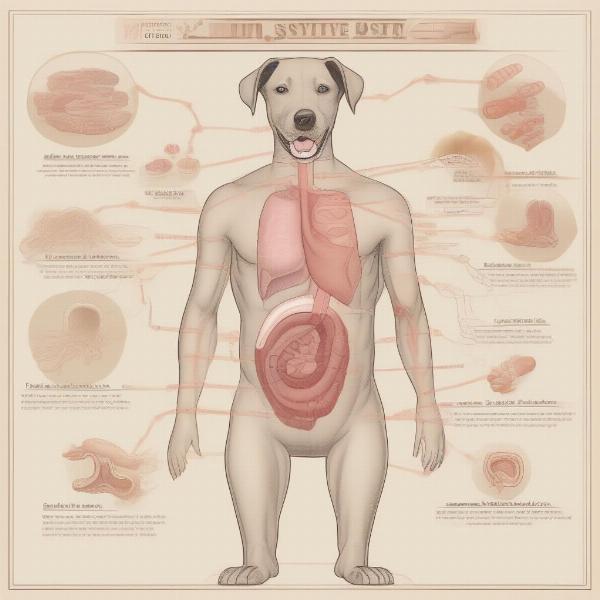A happy dog often has a happy belly! “Belly bliss for dogs” encompasses more than just a full food bowl. It’s about understanding your dog’s digestive system, providing proper nutrition, and recognizing signs of discomfort. Achieving belly bliss ensures your furry friend enjoys optimal health, energy, and a wagging tail.
Understanding Your Dog’s Digestive System
Just like humans, dogs have unique digestive needs. Their system is designed to process a variety of foods, but certain ingredients can cause upset. Knowing the basics of canine digestion can help you make informed choices about what to feed your dog and how to recognize potential problems. The journey starts in the mouth, where chewing breaks down food. Next, it travels to the stomach, where digestive enzymes get to work. From there, it moves through the small and large intestines, where nutrients are absorbed. Finally, waste is eliminated.
 Dog Digestive System Diagram
Dog Digestive System Diagram
Understanding this process helps you appreciate the importance of balanced nutrition and regular vet checkups.
The Importance of a Balanced Diet for Belly Bliss
A balanced diet is the cornerstone of belly bliss. It provides the essential nutrients your dog needs for energy, growth, and overall well-being. Choosing the right food depends on your dog’s age, breed, activity level, and any underlying health conditions. High-quality dog food should contain a balanced mix of proteins, carbohydrates, fats, vitamins, and minerals.
Avoid feeding your dog table scraps, as many human foods are toxic to dogs and can disrupt their digestive system. Instead, opt for healthy treats specifically designed for dogs.
Recognizing Signs of Digestive Discomfort
Even with the best care, dogs can sometimes experience digestive upset. It’s crucial to recognize the signs so you can address the issue promptly. Common signs include vomiting, diarrhea, loss of appetite, lethargy, and excessive gas. If your dog displays any of these symptoms, consult your veterinarian to rule out any underlying medical conditions.
Common Causes of Digestive Upset in Dogs
Several factors can contribute to digestive problems. These include food allergies or intolerances, sudden changes in diet, infections, parasites, stress, and ingestion of foreign objects.
Tips for Maintaining Belly Bliss
Maintaining your dog’s digestive health is an ongoing process. Here are some practical tips:
- Feed a high-quality diet: Choose a dog food appropriate for your dog’s age, breed, and activity level.
- Introduce new foods gradually: Sudden dietary changes can upset your dog’s stomach.
- Provide fresh water: Dehydration can exacerbate digestive problems.
- Establish a regular feeding schedule: This helps regulate digestion.
- Avoid table scraps: Many human foods are toxic to dogs.
- Monitor your dog’s stool: Changes in consistency, color, or frequency can indicate a problem.
- Schedule regular vet checkups: Preventive care is key to identifying and addressing potential issues early.
“A happy gut is a happy dog,” says Dr. Emily Carter, a leading veterinary nutritionist. “By paying attention to your dog’s individual needs and providing a balanced diet, you can ensure their digestive system is functioning optimally.”
“Remember,” adds Dr. Carter, “digestive issues can sometimes be a sign of a more serious underlying condition, so always consult your veterinarian if you’re concerned.”
Conclusion
Belly bliss for dogs is about more than just filling their bowls. It’s a holistic approach that encompasses understanding their digestive needs, providing a balanced diet, recognizing signs of discomfort, and seeking professional advice when necessary. By prioritizing your dog’s digestive health, you’re contributing to their overall happiness, well-being, and quality of life.
FAQ
- What are the signs of a healthy dog’s digestion? Regular bowel movements, normal stool consistency, healthy appetite, and good energy levels.
- How often should I feed my dog? Most adult dogs thrive on two meals a day.
- What should I do if my dog is vomiting or has diarrhea? Contact your veterinarian, especially if the symptoms persist or worsen.
- Can stress affect my dog’s digestion? Yes, stress can significantly impact a dog’s digestive system.
- What are some healthy treats for dogs? Look for treats made with natural ingredients, avoiding artificial colors, flavors, and preservatives.
- How can I transition my dog to a new food? Gradually mix the new food with the old food over several days.
- What are some common food allergies in dogs? Common allergens include beef, chicken, dairy, wheat, and soy.
ILM Dog is your go-to resource for expert advice on dog care, nutrition, training, and more. We provide valuable information to help you navigate all aspects of dog ownership. From choosing the right breed to providing the best care for your senior companion, ILM Dog offers practical tips and guidance to ensure your furry friend lives a happy, healthy life. Contact us at [email protected] or +44 20-3965-8624 for personalized advice. Learn more about how to ensure your dog’s well-being at ILM Dog.